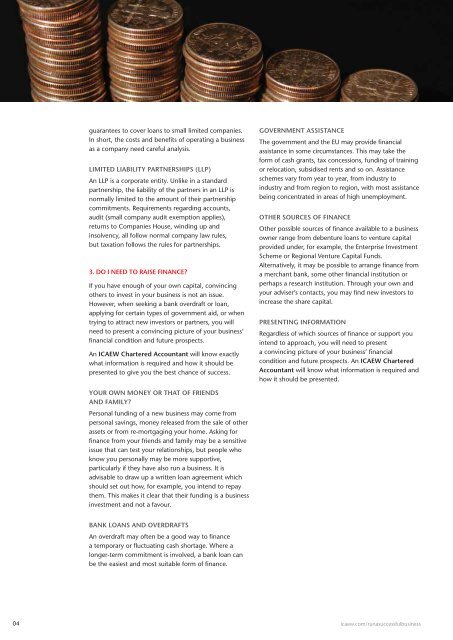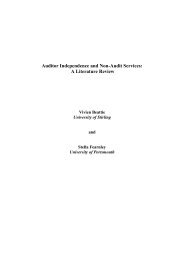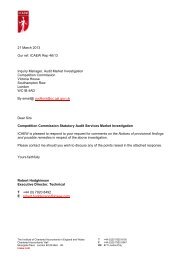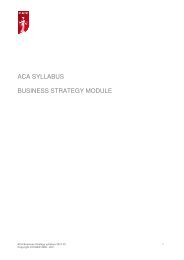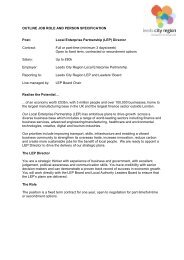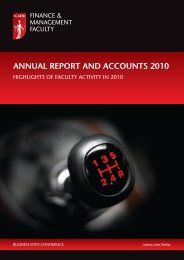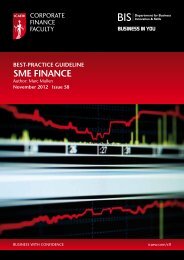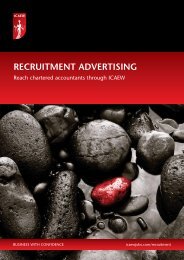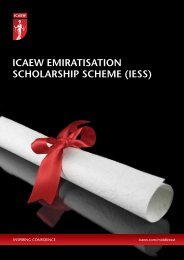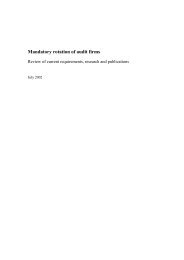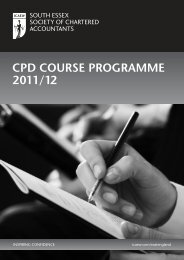RUN A SUCCESSFUL BUSINESS - ICAEW
RUN A SUCCESSFUL BUSINESS - ICAEW
RUN A SUCCESSFUL BUSINESS - ICAEW
Create successful ePaper yourself
Turn your PDF publications into a flip-book with our unique Google optimized e-Paper software.
guarantees to cover loans to small limited companies.<br />
In short, the costs and benefits of operating a business<br />
as a company need careful analysis.<br />
LIMITED LIABILITY PARTNERSHIPS (LLP)<br />
An LLP is a corporate entity. Unlike in a standard<br />
partnership, the liability of the partners in an LLP is<br />
normally limited to the amount of their partnership<br />
commitments. Requirements regarding accounts,<br />
audit (small company audit exemption applies),<br />
returns to Companies House, winding up and<br />
insolvency, all follow normal company law rules,<br />
but taxation follows the rules for partnerships.<br />
3. DO I NEED TO RAISE FINANCE?<br />
If you have enough of your own capital, convincing<br />
others to invest in your business is not an issue.<br />
However, when seeking a bank overdraft or loan,<br />
applying for certain types of government aid, or when<br />
trying to attract new investors or partners, you will<br />
need to present a convincing picture of your business’<br />
financial condition and future prospects.<br />
An <strong>ICAEW</strong> Chartered Accountant will know exactly<br />
what information is required and how it should be<br />
presented to give you the best chance of success.<br />
GOVERNMENT ASSISTANCE<br />
The government and the EU may provide financial<br />
assistance in some circumstances. This may take the<br />
form of cash grants, tax concessions, funding of training<br />
or relocation, subsidised rents and so on. Assistance<br />
schemes vary from year to year, from industry to<br />
industry and from region to region, with most assistance<br />
being concentrated in areas of high unemployment.<br />
OTHER SOURCES OF FINANCE<br />
Other possible sources of finance available to a business<br />
owner range from debenture loans to venture capital<br />
provided under, for example, the Enterprise Investment<br />
Scheme or Regional Venture Capital Funds.<br />
Alternatively, it may be possible to arrange finance from<br />
a merchant bank, some other financial institution or<br />
perhaps a research institution. Through your own and<br />
your adviser’s contacts, you may find new investors to<br />
increase the share capital.<br />
PRESENTING INFORMATION<br />
Regardless of which sources of finance or support you<br />
intend to approach, you will need to present<br />
a convincing picture of your business’ financial<br />
condition and future prospects. An <strong>ICAEW</strong> Chartered<br />
Accountant will know what information is required and<br />
how it should be presented.<br />
YOUR OWN MONEY OR THAT OF FRIENDS<br />
AND FAMILY?<br />
Personal funding of a new business may come from<br />
personal savings, money released from the sale of other<br />
assets or from re-mortgaging your home. Asking for<br />
finance from your friends and family may be a sensitive<br />
issue that can test your relationships, but people who<br />
know you personally may be more supportive,<br />
particularly if they have also run a business. It is<br />
advisable to draw up a written loan agreement which<br />
should set out how, for example, you intend to repay<br />
them. This makes it clear that their funding is a business<br />
investment and not a favour.<br />
BANK LOANS AND OVERDRAFTS<br />
An overdraft may often be a good way to finance<br />
a temporary or fluctuating cash shortage. Where a<br />
longer-term commitment is involved, a bank loan can<br />
be the easiest and most suitable form of finance.<br />
04<br />
icaew.com/runasuccessfulbusiness


